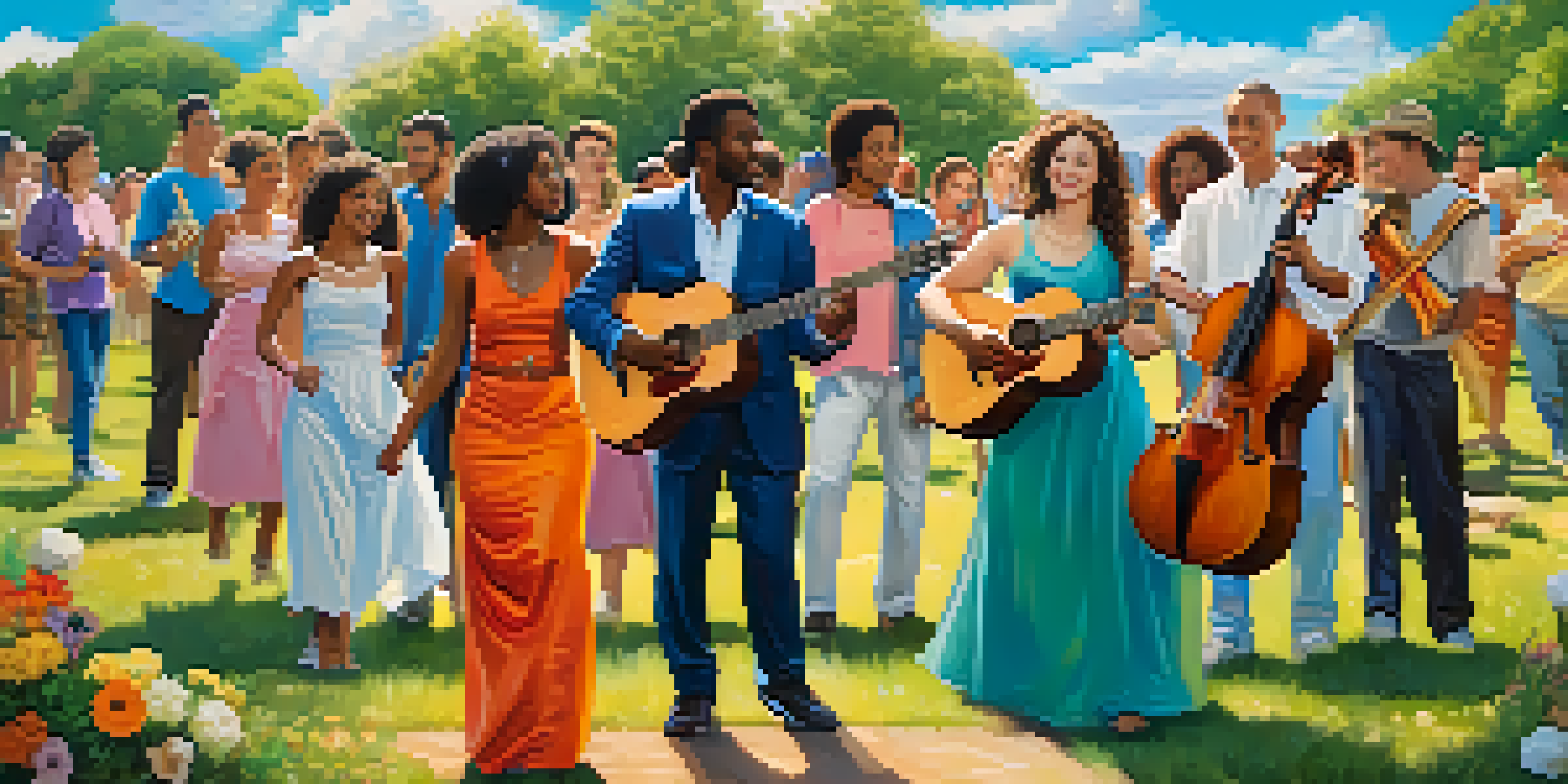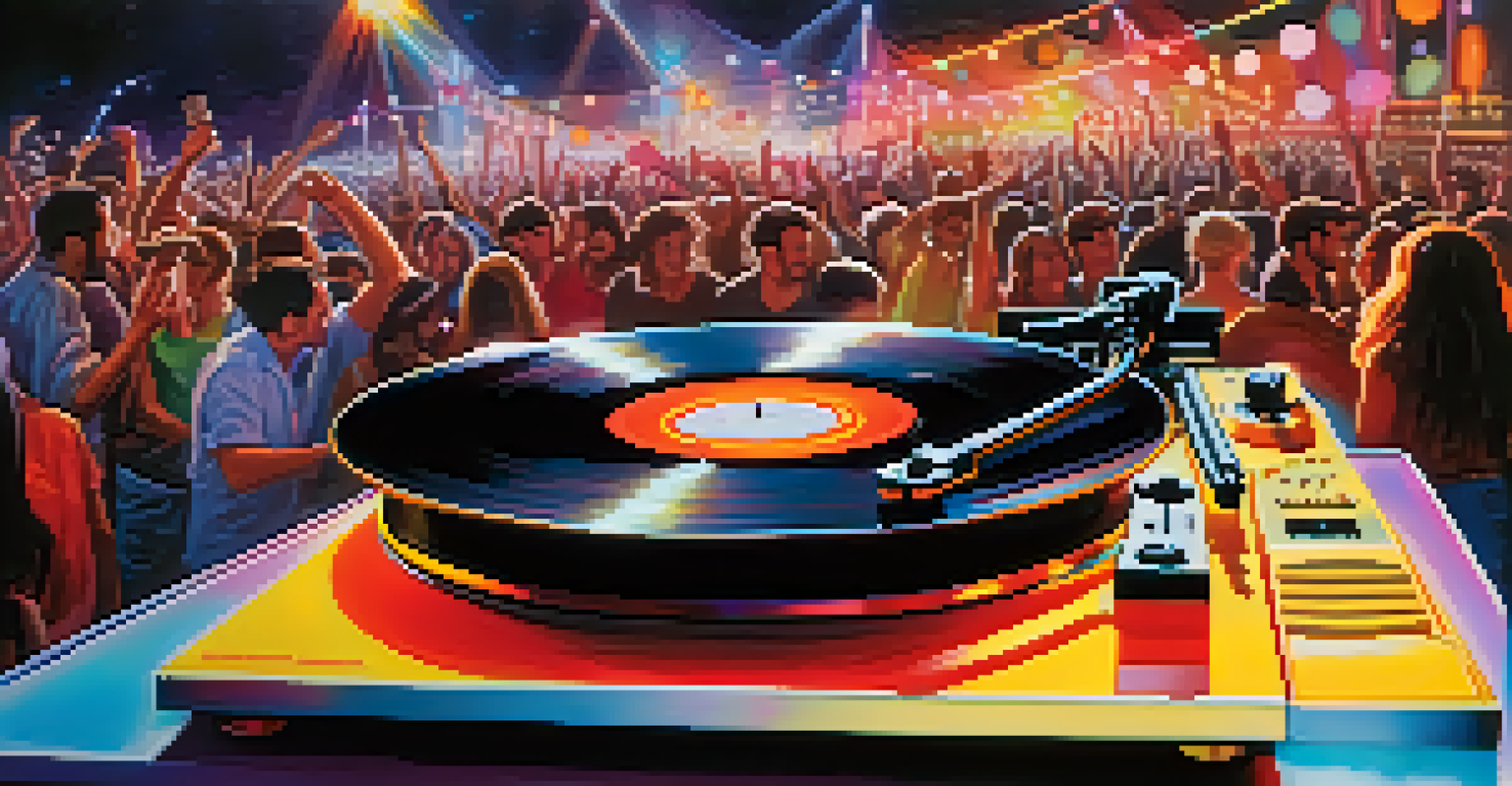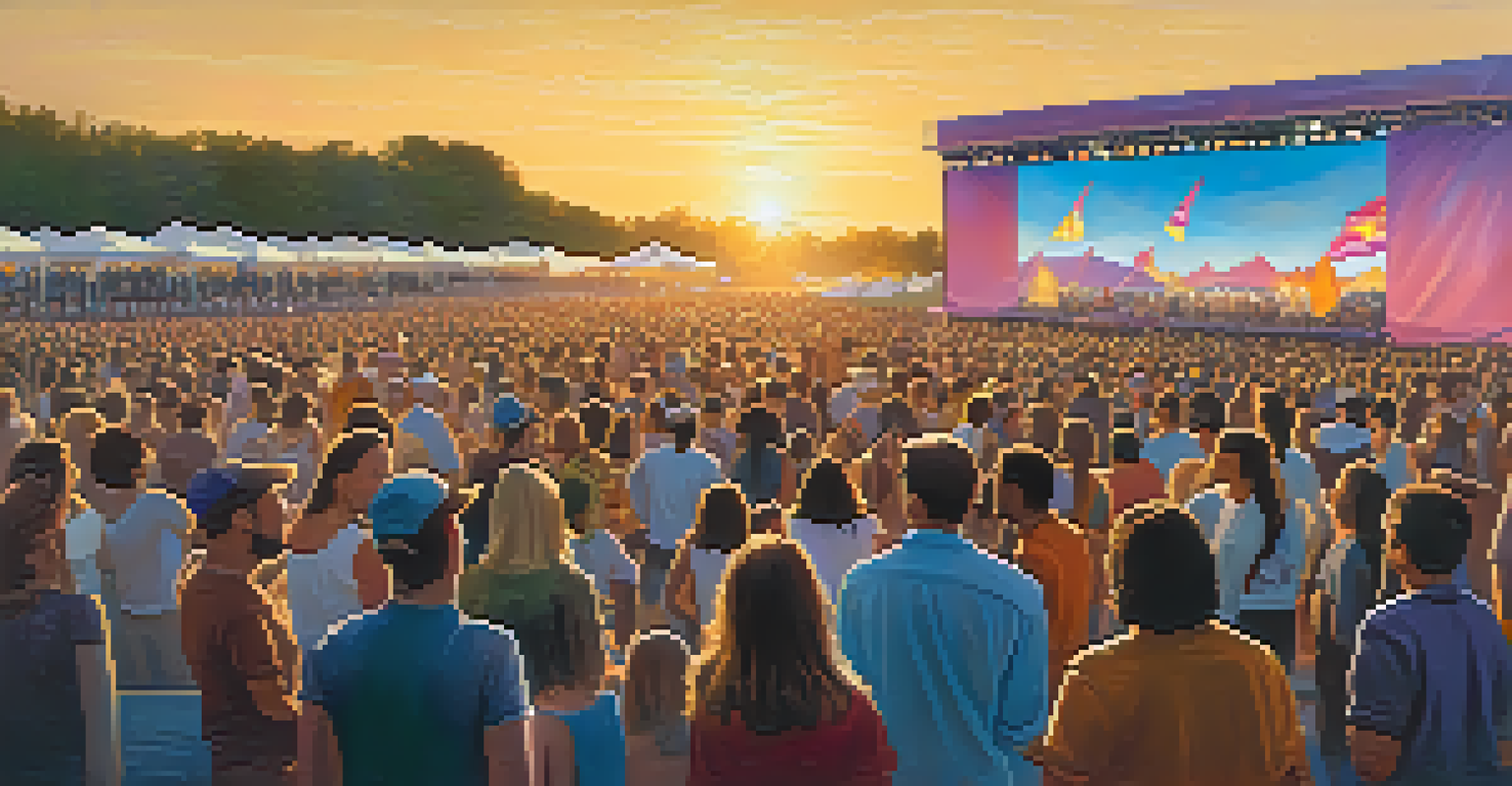The Role of Music in Social Movements: Voices for Change

The Power of Music as a Unifying Force
Music has a remarkable ability to bring people together, transcending barriers of language and culture. In social movements, this unifying force can create a sense of community and shared purpose among diverse groups. For instance, during the civil rights movement in the United States, songs like 'We Shall Overcome' became anthems that rallied supporters around a common goal.
Music is the universal language of mankind.
When people sing together, there’s a shared emotional experience that can be both empowering and healing. This collective participation fosters solidarity, making individuals feel like they are part of something larger than themselves. Music becomes a backdrop for activism, helping to strengthen bonds and energize participants.
Moreover, the communal nature of music can amplify messages of social justice, making them resonate more deeply. It invites people to engage with issues in a way that spoken words alone may not achieve, effectively turning audiences into active participants in the movement.
Historical Examples of Music in Activism
Throughout history, music has played a pivotal role in various social movements. In the 1960s, folk music emerged as a powerful tool for change, with artists like Bob Dylan and Joan Baez using their songs to address issues like war and civil rights. These musicians not only entertained but also educated their audiences about pressing social concerns.

Another notable example is the anti-apartheid movement in South Africa, where songs like 'Nkosi Sikelel' iAfrika' became rallying cries for freedom. These pieces of music connected people across different backgrounds and inspired them to stand against oppression. The emotional weight of these songs helped to keep the spirit of resistance alive during challenging times.
Music Unites for Social Change
Music serves as a powerful catalyst for social movements, fostering community and shared purpose among diverse groups.
These historical instances highlight how music can articulate the frustrations and hopes of a generation, providing a soundtrack to the struggles for justice. By weaving together personal stories and broader societal issues, musicians have historically mobilized support and fostered a sense of urgency.
Modern Music and Contemporary Movements
In today’s digital age, music continues to be a vital component of social movements. Artists leverage platforms like social media to share their music with a global audience, amplifying their messages beyond local communities. For example, the song 'This Is America' by Childish Gambino sparked widespread conversations about gun violence and systemic racism, reaching millions almost instantly.
One good thing about music, when it hits you, you feel no pain.
Moreover, genres like hip-hop and pop have become significant vehicles for activism, with artists using their influence to advocate for change. Collaborations between musicians and activists often result in powerful campaigns that engage younger audiences. This connection between music and activism is especially crucial in raising awareness about issues like climate change and social inequality.
As a result, modern music not only entertains but also educates and inspires action. The ability to share music widely and quickly allows for real-time responses to social issues, making it a dynamic tool for contemporary movements.
The Emotional Impact of Music in Social Movements
Music evokes emotions, making it an effective tool for stirring passion and empathy within social movements. When people listen to songs that reflect their struggles, they often feel validated and understood. This emotional connection can motivate individuals to join a cause, as they resonate with the sentiments expressed in the lyrics.
For instance, during the LGBTQ+ rights movement, songs like 'Born This Way' by Lady Gaga became anthems of pride and acceptance. These types of songs not only celebrate identity but also empower individuals to embrace who they are, fostering a sense of belonging. The emotional uplift provided by such music can rejuvenate activists, highlighting the resilience needed to continue the fight for rights.
Lyrics Drive Activism and Hope
The storytelling nature of lyrics resonates deeply with listeners, inspiring them to reflect on their beliefs and advocate for change.
Ultimately, the emotional impact of music can transform passive listeners into active participants. By tapping into feelings of hope, anger, or joy, songs encourage individuals to take a stand and make their voices heard, reinforcing the idea that they are not alone in their struggles.
The Role of Lyrics in Conveying Messages
Lyrics serve as the heart of a song, often encapsulating the core messages of social movements. Powerful words can inspire individuals to reflect on their beliefs and actions. For example, songs like 'Alright' by Kendrick Lamar capture the struggles faced by marginalized communities while simultaneously instilling hope and resilience.
The storytelling aspect of lyrics allows artists to share personal experiences that resonate with listeners on a deeper level. When people hear stories that mirror their own, it can ignite a desire to advocate for change. This connection through storytelling makes complex issues more relatable, breaking down barriers of understanding.
Additionally, impactful lyrics can serve as rallying cries, motivating individuals to come together for a common cause. They often encapsulate the frustrations and aspirations of a movement, pushing listeners to not only feel but act, reinforcing the idea that music can be a catalyst for social change.
Music Festivals as Platforms for Activism
Music festivals have evolved into powerful platforms for activism, combining entertainment with social awareness. Events like Coachella and Glastonbury often feature artists who use their performances to raise awareness about various causes. This unique blend of music and activism can attract large audiences, making it an effective way to spread important messages.
By incorporating discussions and initiatives into these festivals, organizers create spaces for dialogue and education. For example, the Global Citizen Festival not only showcases performances but also inspires attendees to take action against poverty and inequality. The festival format encourages attendees to engage with social issues while enjoying music, making activism accessible and enjoyable.
Festivals Amplify Activist Messages
Music festivals combine entertainment and social awareness, providing platforms for artists to engage large audiences in important causes.
Through this fusion of music and social activism, festivals can inspire collective action. Participants leave not just entertained but also motivated to contribute to causes they care about, emphasizing the idea that music can spark change on a larger scale.
The Future of Music in Social Advocacy
Looking ahead, the role of music in social movements is likely to evolve alongside changing technology and cultural landscapes. As new platforms emerge, artists will continue to find innovative ways to connect with their audiences and advocate for change. This adaptability ensures that music remains a vital tool in the fight for social justice.
Moreover, the rise of virtual events and online communities opens up new avenues for collaboration and engagement. Musicians can now reach global audiences instantly, creating a more interconnected movement. This shift allows for diverse voices to be heard, fostering a rich tapestry of perspectives in advocacy efforts.

Ultimately, as long as there are social issues to address, music will play a crucial role in uniting voices for change. The future holds endless possibilities for how music continues to inspire and mobilize individuals, proving that the rhythm of activism is here to stay.